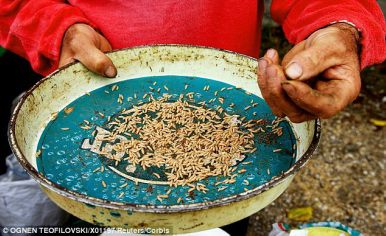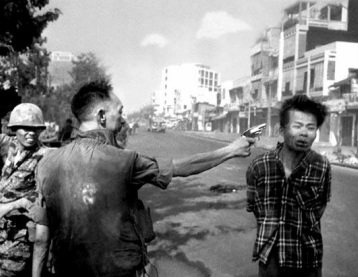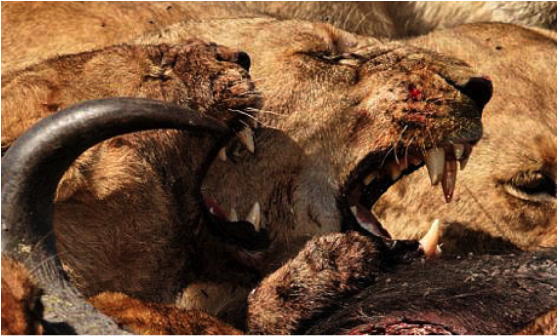Out Of The Wild
I just finished watching “Into the wild,” a reality show about nine average people left in wilds of Venezuela with a map, three days of survival training, and twenty-four hours worth of food and water, on what turns out to be a twenty-seven day journey. They’re forced to traverse treacherous mountain ranges, forests filled with tarantulas and some of the most poisonous snakes in the world, savannas populated by jaguars and quicksand, endless waterways with anaconda and large Caiman (The alligator of South America), and genuine starvation. There’s no prize, no winners, only survivors, with one purpose, to get the hell out of the wild. It made for fascinating television, and the participants often turned out to be heroic figures who endured what most of us will thankfully never have to—driven by one basic motive; to prove that they could.
As television goes, it was brilliant, mostly because it involved real people living at their most primal. The brilliance wasn't in the execution, or even the idea. It doesn't require a genius to place people in harm’s way and then point a camera. The drama was in the beauty of a true wilderness, its deadly capacity, and the question of what happens when “Civilized” people are removed from “Civilization.”
There was, of course, a safety valve, a way of escape that would never exist if you were really stranded in one of the harshest environments in the world. They could press a button on a cell phone like device and a helicopter would be sent to take them out of the wild to safety. This one variable created a world of difference. It was the difference between reality and reality television.
What was most interesting was how quickly deprivation changed behavior and made a handful of insect larvae look like a feast. In a world of deprivation, even pulsing, slimy, bugs became a delicacy. In our everyday world of abundance we tend to take for granted prosperity, but, just as surely, have a disregard for how clever and capable so-called “Primitive” cultures can be—which turned out to be a hell of a lot more capable than your average office worker, or even the most adept member of the group, an army ranger.
As television goes, it was brilliant, mostly because it involved real people living at their most primal. The brilliance wasn't in the execution, or even the idea. It doesn't require a genius to place people in harm’s way and then point a camera. The drama was in the beauty of a true wilderness, its deadly capacity, and the question of what happens when “Civilized” people are removed from “Civilization.”
There was, of course, a safety valve, a way of escape that would never exist if you were really stranded in one of the harshest environments in the world. They could press a button on a cell phone like device and a helicopter would be sent to take them out of the wild to safety. This one variable created a world of difference. It was the difference between reality and reality television.
What was most interesting was how quickly deprivation changed behavior and made a handful of insect larvae look like a feast. In a world of deprivation, even pulsing, slimy, bugs became a delicacy. In our everyday world of abundance we tend to take for granted prosperity, but, just as surely, have a disregard for how clever and capable so-called “Primitive” cultures can be—which turned out to be a hell of a lot more capable than your average office worker, or even the most adept member of the group, an army ranger.

The one overarching theme was just how much survival depends on having the necessary knowledge and skills to negotiate your environment. If you have the right knowledge, it can be a wondrous place where your basic needs are free, growing on trees. But there were also some of the world’s deadliest predators, hidden in plain sight—a natural world as Tennyson said, “That is red of tooth and claw”! This was not a case of wandering through a carefully managed forest with the illusion of control, shaped for our personal amazement and comfort. The possibility of death was real, and the participants learned to kill to survive, although they did so reluctantly, but, eventually, they killed without hesitation.
For all of the participants it was a revelatory experience. The religious among them said they never felt closer to God. No one thought in terms of some inherent fairness. It wasn’t unfair to kill a cute turtle for food. It was necessary, just as the turtle killed for food. No one killed for sport, resources were too scarce and life to valuable. No one took more than their share. People divided up the spoils equally. It was simply in everyone’s interest to keep the group acting as a group, without group cohesion everyone was at risk. If people didn’t pull their weight, they were quickly chastised. If they couldn’t pull their weight due to sickness or exhaustion, everyone pulled together to ease their burden. Cooperation was automatic, although there were conflicts. Every member of the group understood that they might be in exactly the same circumstances at any moment. If you were bitten by a snake, or sprained an ankle and couldn’t walk, the only way you survived was by relying on the mercy of the group. This was just as true of the strongest members as it was the weakest. It wasn't survival of the fittest; it was survival of the weakest to insure that everyone survived.
Competition and cooperation weren't competing philosophies, they were different sides of the same coin. People fell into natural roles that were the product of their varying strengths and weaknesses. The strongest member of the group physically, and the one best suited to take the lead, machete in hand, and hack their way through dense jungle, was the army ranger. He became the de facto leader, his training in the military as a leader of men was it's own trial by fire, and he doggedly moved forward in almost every circumstance to drive the group to safety.
There were the unexpected heroes, the journalist who also happened to be an endurance athlete. He was relentlessly positive, frequently giving the group that much-needed boost to carry on, no matter the difficulty. The biologist, the most divisive member of the group, turned out to be the best hunter, in spite of the fact that he hated to kill. The smallest and least physical male had a "Never say die" attitude that made even the army ranger stand in awe. And maybe the most compelling figure was the lone female among the survivors. She remained calm, positive and became whatever the group needed her to be, selflessly searching for food, building shelter, making sacrifices, while maintaining a smile and, miraculously, a natural beauty. When the men could barely move from exhaustion, she kept going.
The various roles that each member fell into were decided naturally. There was no voting, just people doing what they did best. There were no political debates, sexual roles, religious conflict, economic theory or class systems, there was survival, friendship, and equal parts of rugged individualism and rugged collectivism. It was a controlled experiment in human nature.
There were those variables that inevitably changed things simply by placing an all-seeing eye, like a camera, in the middle of the group. And by giving them a means of escape should things get too bad, changed the dynamic yet again.
Without those two variables would their behavior have been less "Civilized"? The answer is probably "yes" at least in some ways, and "no" in others. When people have a sense of accountability to some source greater than themselves they tend to be less selfish. In this case, it was fidelity to the group, but no less so to the millions of viewers watching on television, which included the family and friends of the various group members . But, what happens when no one is watching, when there is no authority greater than our own inner voice and we're driven by hunger and basic survival? If we are really nothing more than a collection of genetic traits, primarily motivated by what Richard Dawkins has called the selfish gene, the answer should be obvious. If, however, we carry within us an "Inherent" morality that is always tugging us in the right direction, not an angel on our shoulders literally, but a collection of complex, inherent traits, shaped by individual choice as well as environment, then we have a refuge beyond the wild. The "Wild" becomes the starting place, not the final destination.
For all of the participants it was a revelatory experience. The religious among them said they never felt closer to God. No one thought in terms of some inherent fairness. It wasn’t unfair to kill a cute turtle for food. It was necessary, just as the turtle killed for food. No one killed for sport, resources were too scarce and life to valuable. No one took more than their share. People divided up the spoils equally. It was simply in everyone’s interest to keep the group acting as a group, without group cohesion everyone was at risk. If people didn’t pull their weight, they were quickly chastised. If they couldn’t pull their weight due to sickness or exhaustion, everyone pulled together to ease their burden. Cooperation was automatic, although there were conflicts. Every member of the group understood that they might be in exactly the same circumstances at any moment. If you were bitten by a snake, or sprained an ankle and couldn’t walk, the only way you survived was by relying on the mercy of the group. This was just as true of the strongest members as it was the weakest. It wasn't survival of the fittest; it was survival of the weakest to insure that everyone survived.
Competition and cooperation weren't competing philosophies, they were different sides of the same coin. People fell into natural roles that were the product of their varying strengths and weaknesses. The strongest member of the group physically, and the one best suited to take the lead, machete in hand, and hack their way through dense jungle, was the army ranger. He became the de facto leader, his training in the military as a leader of men was it's own trial by fire, and he doggedly moved forward in almost every circumstance to drive the group to safety.
There were the unexpected heroes, the journalist who also happened to be an endurance athlete. He was relentlessly positive, frequently giving the group that much-needed boost to carry on, no matter the difficulty. The biologist, the most divisive member of the group, turned out to be the best hunter, in spite of the fact that he hated to kill. The smallest and least physical male had a "Never say die" attitude that made even the army ranger stand in awe. And maybe the most compelling figure was the lone female among the survivors. She remained calm, positive and became whatever the group needed her to be, selflessly searching for food, building shelter, making sacrifices, while maintaining a smile and, miraculously, a natural beauty. When the men could barely move from exhaustion, she kept going.
The various roles that each member fell into were decided naturally. There was no voting, just people doing what they did best. There were no political debates, sexual roles, religious conflict, economic theory or class systems, there was survival, friendship, and equal parts of rugged individualism and rugged collectivism. It was a controlled experiment in human nature.
There were those variables that inevitably changed things simply by placing an all-seeing eye, like a camera, in the middle of the group. And by giving them a means of escape should things get too bad, changed the dynamic yet again.
Without those two variables would their behavior have been less "Civilized"? The answer is probably "yes" at least in some ways, and "no" in others. When people have a sense of accountability to some source greater than themselves they tend to be less selfish. In this case, it was fidelity to the group, but no less so to the millions of viewers watching on television, which included the family and friends of the various group members . But, what happens when no one is watching, when there is no authority greater than our own inner voice and we're driven by hunger and basic survival? If we are really nothing more than a collection of genetic traits, primarily motivated by what Richard Dawkins has called the selfish gene, the answer should be obvious. If, however, we carry within us an "Inherent" morality that is always tugging us in the right direction, not an angel on our shoulders literally, but a collection of complex, inherent traits, shaped by individual choice as well as environment, then we have a refuge beyond the wild. The "Wild" becomes the starting place, not the final destination.

Alfred Tennyson, the English poet, writing about the Christian’s struggle with the seeming brutality of the natural world wrote:
"Who trusted God was love indeed
And love Creation's final law
Tho' Nature, red in tooth and claw
With ravine, shrieked against his creed"
It intended to pose the question about the apparent conflict between love as the basis of the Christian religion and the callousness of nature. If nature is purposeless and heartless, how can we believe in creation's final law? But, as a Christian, how could he not?
Behavior, like all things, is the product of evolution and change, survival and struggle, but traits like love, mercy and altruism appear to be an essential part of who we are. Some variation on this notion of self sacrifice did not evolve uniquely in humans, but can be observed in animals and even among insects. Why? No one knows, not really. And in order for man to survive, including the natural world over which he has dominion, it is love and mercy that are the greater truths that complete the story. Blind, purposeless evolution is not "The" truth, it's a piece of the puzzle. By itself, it is inherently nihilistic, and generations of scientists and leaders, motivated by Darwin's hypothesis, have proved that all too effectively. Mercy and self sacrifice are the escape valves, without them none of us gets out of here alive.
Mark Magula
"Who trusted God was love indeed
And love Creation's final law
Tho' Nature, red in tooth and claw
With ravine, shrieked against his creed"
It intended to pose the question about the apparent conflict between love as the basis of the Christian religion and the callousness of nature. If nature is purposeless and heartless, how can we believe in creation's final law? But, as a Christian, how could he not?
Behavior, like all things, is the product of evolution and change, survival and struggle, but traits like love, mercy and altruism appear to be an essential part of who we are. Some variation on this notion of self sacrifice did not evolve uniquely in humans, but can be observed in animals and even among insects. Why? No one knows, not really. And in order for man to survive, including the natural world over which he has dominion, it is love and mercy that are the greater truths that complete the story. Blind, purposeless evolution is not "The" truth, it's a piece of the puzzle. By itself, it is inherently nihilistic, and generations of scientists and leaders, motivated by Darwin's hypothesis, have proved that all too effectively. Mercy and self sacrifice are the escape valves, without them none of us gets out of here alive.
Mark Magula
|
|
|
